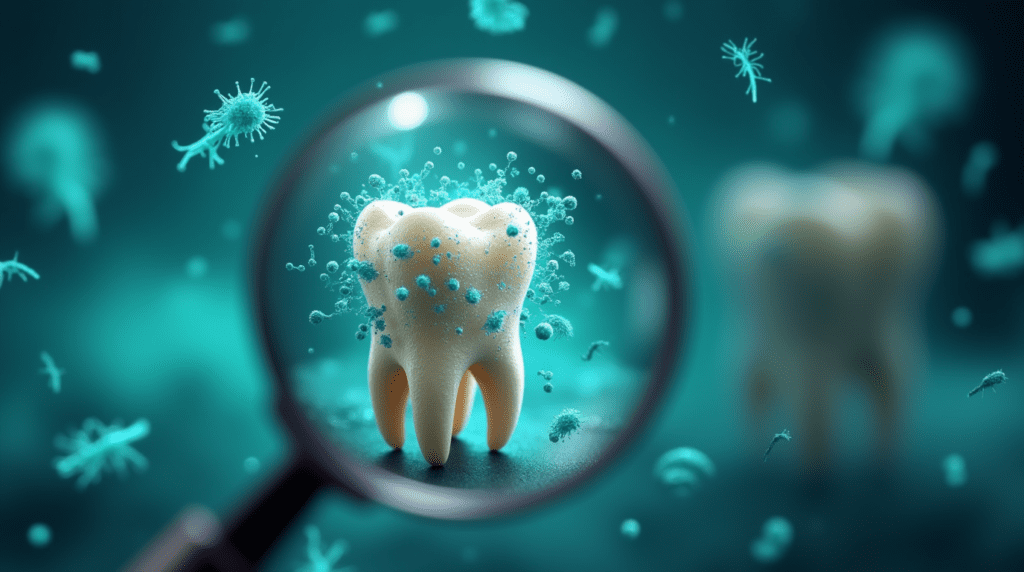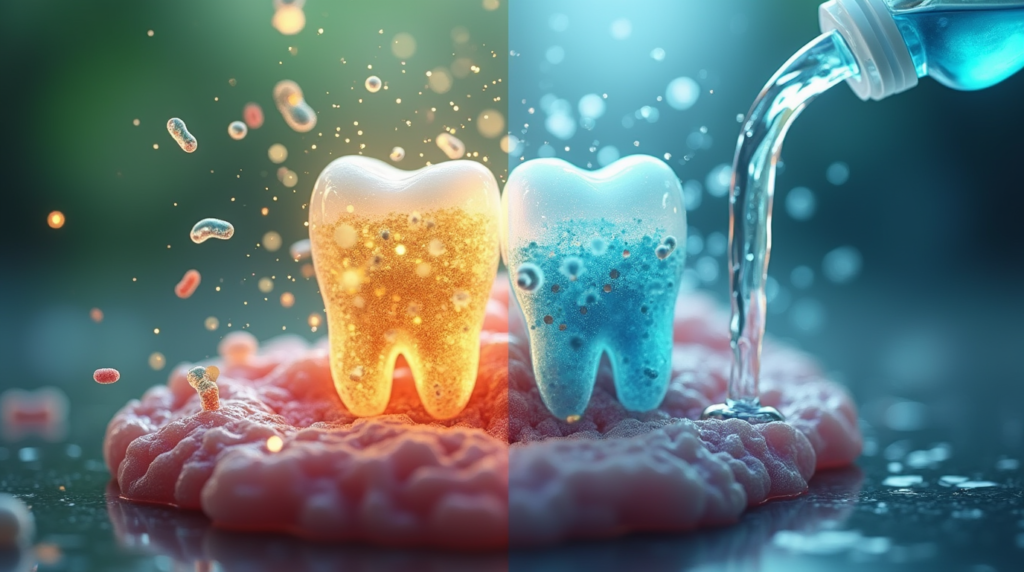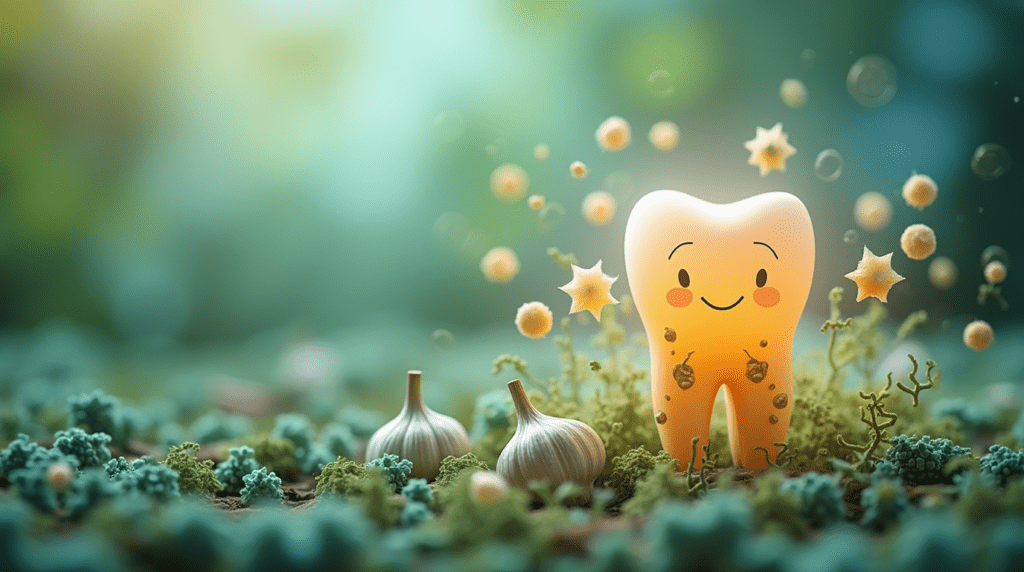We’ve talked about oral probiotics and the “good guys” – the beneficial bacteria in your mouth. But to truly understand how these tiny helpers work, we need to zoom out and look at the bigger picture: the oral microbiome. Think of your mouth not just as an opening for food and words, but as a vibrant, complex ecosystem teeming with life. This hidden world plays a crucial role in your oral health and, surprisingly, even your overall well-being.
Table of Contents
What Exactly is an Ecosystem?
Before we delve into the specifics of the oral microbiome, let’s quickly define what an ecosystem is. In nature, an ecosystem is a community of living organisms (plants, animals, microorganisms) that interact with each other and their physical environment. It’s a delicate balance where each component plays a role in the overall health and stability of the system.
Now, apply that concept to your mouth.
The Unique Environment of Your Mouth
Your mouth provides a unique habitat for a vast array of microorganisms. It’s warm, moist, and constantly supplied with nutrients from the food and drinks you consume. The pH level fluctuates, and saliva, that often-underappreciated fluid, plays a crucial role in shaping this environment. This specific set of conditions makes your mouth a distinct ecological niche, different from your gut or any other part of your body.
Diversity is the Spice of Life: The Variety Within
Just like a rainforest or a coral reef, the oral microbiome boasts incredible microbial diversity. Scientists have identified hundreds of different species of bacteria residing in the human mouth, and that’s not even counting the fungi, viruses, and protozoa that also call it home. This variety is actually a sign of a healthy ecosystem. Different microbes have different roles, and their interactions contribute to the overall stability and function of the mouth ecosystem.
The Balance of Power: Symbiosis and Dysbiosis
In a healthy oral microbiome, many of these microorganisms live in a state of symbiosis, meaning they coexist peacefully, and sometimes even benefit from each other. For example, some bacteria might break down complex food particles, making them easier for other bacteria to utilize. However, this delicate balance can be disrupted. When the “bad” bacteria gain the upper hand and outnumber the “good” bacteria, a state of dysbiosis occurs. This imbalance is often at the root of many oral health problems.
Think of it like an overgrown garden where weeds (bad bacteria) choke out the flowers (good bacteria). This imbalance can lead to:
- Bad Breath (Halitosis): Certain bacteria produce volatile sulfur compounds that cause unpleasant odors.
- Plaque Buildup: An overgrowth of specific bacteria contributes to the formation of sticky plaque on your teeth.
- Gum Disease (Gingivitis and Periodontitis): Certain bacteria trigger inflammation and damage the gum tissue and bone supporting your teeth.
- Cavities (Dental Caries): Bacteria like Streptococcus mutans produce acids that erode tooth enamel.
Factors Influencing Your Mouth’s Hidden Ecosystem
The composition of your oral microbiome is not fixed. It’s a dynamic community that can be influenced by various factors, including:
- Genetics: Your individual genetic makeup can play a role in the types of bacteria that naturally colonize your mouth.
- Diet: A diet high in sugar and processed foods can fuel the growth of harmful bacteria.
- Oral Hygiene Practices: Regular brushing, flossing, and tongue scraping are crucial for maintaining a healthy balance by removing excess bacteria and food debris. You can find helpful tips on oral hygiene from resources like the (External Link).
- Lifestyle: Factors like smoking and stress can negatively impact the oral microbiome.
- Medications: Some medications, particularly antibiotics, can disrupt the balance of bacteria in your mouth.
The Oral Microbiome’s Crucial Role in Health and Disease
This hidden ecosystem in your mouth isn’t just about teeth and gums. It plays a vital role in:
- Digestion: As mentioned earlier, some bacteria in your mouth begin the process of breaking down food.
- Immunity: The oral microbiome acts as a first line of defense against invading pathogens. The “good” bacteria can help train your immune system and prevent harmful microbes from taking hold.
- Potential Links to Systemic Health: Emerging research suggests a connection between imbalances in the oral microbiome and systemic diseases like cardiovascular disease, diabetes, and even Alzheimer’s disease. This highlights the importance of maintaining a healthy mouth ecosystem.

How Oral Probiotics Support a Healthy Oral Microbiome
Now we come full circle back to oral probiotics. By introducing beneficial bacteria that are naturally found in a healthy mouth, oral probiotics can help:
- Restore Balance: They can help shift the balance of the oral microbiome back towards a healthier state, especially when it has been disrupted by factors like poor diet or antibiotic use.
- Increase Microbial Diversity: Some oral probiotic supplements contain a variety of beneficial strains, which can contribute to a more diverse and resilient mouth ecosystem.
- Support the “Good Guys”: They provide a boost to the existing beneficial bacteria, helping them to thrive and effectively compete with harmful microbes.
The Takeaway: Your Mouth is More Than Just a Mouth
The oral microbiome is a fascinating and complex world within your mouth that plays a vital role in your oral and overall health. Understanding this hidden ecosystem and the importance of maintaining its delicate balance is key to a healthy smile and a healthier you. By adopting good oral hygiene habits, making smart dietary choices, and considering the addition of oral probiotics to your routine, you can actively support the “good guys” and cultivate a thriving mouth ecosystem for years to come.
In our next article, we’ll explore the specific benefits of oral probiotics in more detail, showcasing how these beneficial bacteria can contribute to a healthier and happier mouth. Stay tuned!




